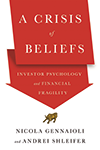Book of the week: irrational markets and investor psychology
A Crisis of BeliefsAcademic economists Nicola Gennaioli and Andrei Shleifer argue that financial markets can, behave in irrational ways.

Get the latest financial news, insights and expert analysis from our award-winning MoneyWeek team, to help you understand what really matters when it comes to your finances.
You are now subscribed
Your newsletter sign-up was successful
Want to add more newsletters?

Twice daily
MoneyWeek
Get the latest financial news, insights and expert analysis from our award-winning MoneyWeek team, to help you understand what really matters when it comes to your finances.

Four times a week
Look After My Bills
Sign up to our free money-saving newsletter, filled with the latest news and expert advice to help you find the best tips and deals for managing your bills. Start saving today!

Investor Psychology and Financial Fragility
Princeton University Press, £24
MoneyWeek
Subscribe to MoneyWeek today and get your first six magazine issues absolutely FREE

Sign up to Money Morning
Don't miss the latest investment and personal finances news, market analysis, plus money-saving tips with our free twice-daily newsletter
Don't miss the latest investment and personal finances news, market analysis, plus money-saving tips with our free twice-daily newsletter
Financial economists tend to believe in what is known as the "rational expectations hypothesis" (REH). Put simply, they assume that people automatically make optimal decisions after taking into account all available information. Such a simplification may be useful when building an economic model, and indeed it has a kernel of truth, but it flies in the face of the evidence that people can behave in quite irrational ways. In this book, academic economists Nicola Gennaioli and Andrei Shleifer examine the financial crisis of 2008-2009 to assess the REH's shortcomings and to look at alternatives.
They consider two questions. First, why did apparently intelligent and well-educated people overlook the problems with the financial system, even after credit conditions started to tighten from the summer of 2007? Second, why did investors' sentiment shift so dramatically following the collapse of Lehman Brothers? In their view, the second question is as important as the first, since there are several plausible explanations for the emergence and persistence of the subprime bubble, but fewer explanations for why it suddenly collapsed.
Their view, backed up by evidence from surveys of investors' sentiment taken immediately before and after the crisis, is that it stemmed from our tendency to use our recent experiences to temper our expectations about the future (or what they call the "diagnostic expectations hypothesis"). This generally enables us to strike a balance between looking at what's happened in the past and thinking about the future.
But it can lead us to swing from complacency to panic in our perception of improbable, but catastrophic, events.
In other words, just because things are going well, people begin to assume that they will always go well. Even in the early stages of the crisis (the so-called "credit crunch"), the fact that the financial system seemed to be coping meant that people remained complacent. When Lehman collapsed, people overgeneralised in the other direction, assuming the risks were greater than they were, causing a panic.
Gennaioli and Shleifer seek to straddle a middle ground between the REH and models that are more backward looking. But it is also a bit simplistic, as it ignores the other reasons for the wild market swings during this period, such as monetary conditions, moral hazard and groupthink, as well as all the other psychological biases investors suffer from.
The book isn't helped by the fact that the authors succumb to the obsession in modern economics with complicated equations. Still, it's nice to see academic economists acknowledging that financial markets can, indeed, behave in irrational ways.
Get the latest financial news, insights and expert analysis from our award-winning MoneyWeek team, to help you understand what really matters when it comes to your finances.

-
 Should you buy an active ETF?
Should you buy an active ETF?ETFs are often mischaracterised as passive products, but they can be a convenient way to add active management to your portfolio
-
 Power up your pension before 5 April – easy ways to save before the tax year end
Power up your pension before 5 April – easy ways to save before the tax year endWith the end of the tax year looming, pension savers currently have a window to review and maximise what’s going into their retirement funds – we look at how